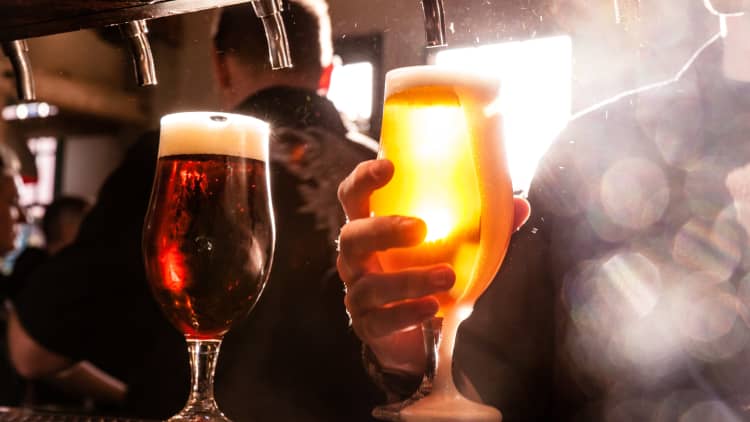A 75-year-old seasoning is spicing up the Maryland beer business.
When Flying Dog Brewery, Maryland's largest craft brewery, struck a deal to license a beer made with Old Bay seasoning, brewery officials knew it would generate some buzz. But not even the man who worked to put the partnership together anticipated the frenzy the brew would inspire.
Old Bay, made by fellow Maryland-based company McCormick & Co., is a seasoning mix made with 18 herbs and spices including celery salt, red and black pepper, and paprika, that is a Chesapeake Bay-area restaurant and kitchen staple.
"We originally had in our production schedule what we believed to be enough beer to sell to anyone who wanted it up and down the east coast for five months," said Jim Caruso, CEO of Flying Dog Brewery. "In eight days, we sold that amount of beer just in Frederick and Baltimore, Maryland, alone."
It turns out the marriage of two Maryland favorites stirred up a fierce case of Chesapeake pride.
Read MoreChicago is Lagunitas Brewing's kind of town
"People were ordering this beer before they even tried it," Caruso said. "We had people in Frederick trying to bribe the distributors and their drivers with $100 to give them a case of beer off the truck."
Caruso says not only did people try Dead Rise, named after the wooden-hulled fishing and crabbing boats used to navigate the Chesapeake Bay, they kept coming back for more.
Read MoreStone Brewing to open brewery in Berlin
Knowing they had a hit on their hands, Flying Dog made the decision to shift as much production as possible to Dead Rise. So out went the original plan of selling the beer throughout the Mid-Atlantic from New York down to North Carolina.
For about five weeks, Flying Dog shifted 65 percent of its total production capacity to focus solely on meeting Maryland's demand for the beer.
"We're selling more Dead Rise just in the state of Maryland than we are with all our other 40-plus beers combined everywhere else," Caruso said.
Still the decision wasn't an easy one for many reasons, not the least of which was focusing so heavily on the demand for Dead Rise meant the Flying Dog had to temporarily stop all beer shipments to the 26 other states in which they have distribution.
Caruso said the decision was a painful one because they didn't want to risk damaging out-of-state relationships, but being a Maryland company meant putting the Maryland market first.
"That's one of the meanings in local," Caruso said. "Taking millions dollars in profits from one part of the country and giving it to our local beer stores and bars because this is a Maryland beer, it's the right thing to do."

While Dead Rise may be an extreme example, the idea of focusing on local needs is a core part the Flying Dog philosophy.
Flying Dog and Old Bay are donating a portion of the proceeds from Dead Rise to True Blue, a program that advocates on behalf of the Chesapeake Bay's 5,500 watermen and promotes sustainably harvested Maryland Blue Crab.
The brewery also donates a portion of sales from its Pearl Necklace Oyster Stout to the Oyster Recovery Partnership. Since the program started in 2011, Flying Dog proceeds have assisted in planting nearly 3 million oysters in the Chesapeake Bay.
Read MoreWhat'll you have? US drinkers say beer
The local focus means, for now, the Old Bay-seasoned beer taking Maryland by storm will remain just for Maryland.
"It's humbling and flattering to know other locations want the beer, but we're saying we're only capable of producing so much and if Maryland bars and restaurants want it, they got it," said Caruso.
The licensing deal with McCormick for the Old Bay trademark only lasts through September, but based on this summer's sales, it's a good bet the Dead Rise brew will be return.
"I would hope McCormick would be interested in partnering with us again next year," said Caruso. "However, we could still do Dead Rise, it just wouldn't have the official license for the Old Bay mark on it, but we could still do a beer made with Old Bay."
—By CNBC's Tom Rotunno


